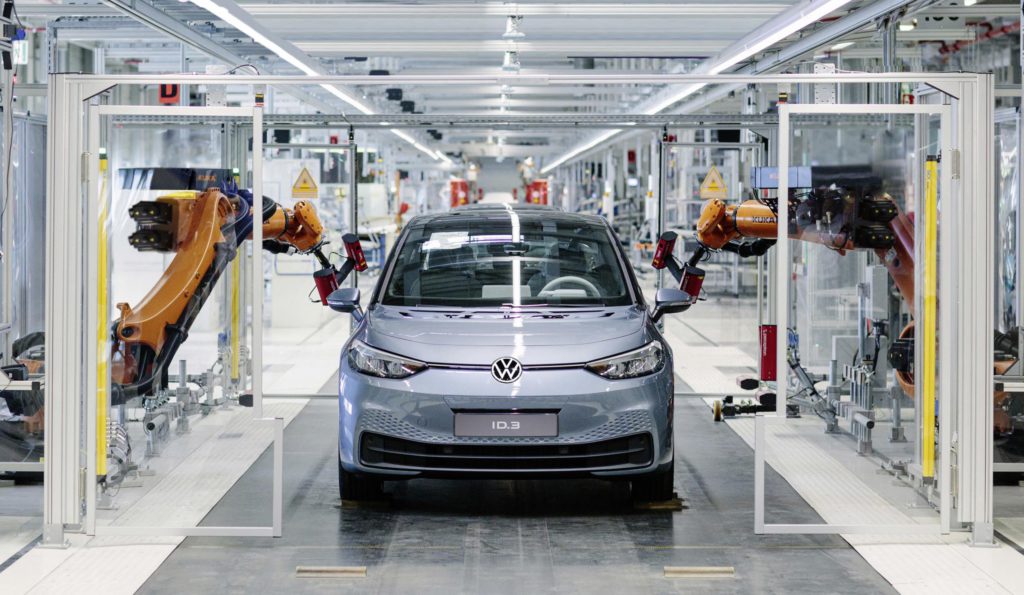VW increases 2025 EV production forecast to 1.5 million units
07 January 2020

7 January 2020
Volkswagen Group (VW) is investing €33 billion in electromobility by 2024, including €11 billion in the Volkswagen brand, as it strives to become the global market leader in electric vehicles (EVs). Under the latest plans, the strategic target of one million EVs is expected to be reached by the end of 2023 – two years earlier than previously predicted. The Volkswagen brand expects 1.5 million electric cars to be produced in 2025.
The all-electric ID.3 had its world premiere at the Frankfurt Motor Show in September and started production at the Zwickau electric vehicle plant in November, with the first cars set to appear on Europe’s roads in the summer. The model is based on Volkswagen’s modular electric-drive platform, MEB, and offers ranges from 330 to 550 kilometres under WLTP testing. The basic version of the model will cost less than €30,000 and over 37,000 customers have already reserved an ID.3 and paid a pre-booking deposit.
EV offensive gathers pace
Following the ID.3, VW’s first all-electric SUV – the series production model of the ID. CROZZ2 – will celebrate its world premiere in 2020, with production of this vehicle expected to start at the Zwickau plant by the end of the year too.
′2020 will be a key year for the transformation of Volkswagen. With the market launch of the ID.3 and other attractive models in the ID. family, our electric offensive will also become visible on the roads,’ said Thomas Ulbrich, member of the Volkswagen brand board of management responsible for e-mobility, in a company release.
From 2021, up to 330,000 EVs will leave the Zwickau assembly line each year, making it the largest and most efficient EV factory in Europe. Preparations for the start of production of the ID. family are also well underway in China and the USA; pre-production has already started at VW’s Anting plant in China.
′Our new overall plan for 1.5 million electric cars in 2025 shows that people want climate-friendly individual mobility – and we are making it affordable for millions of people,’ Ulbrich added.
A 2018 study by the European Automobile Manufacturers Association (ACEA) showed that affordability of EVs remains a strong deterrent for customers across the EU.
Autovista Group analysis has uncovered that the VW e-Golf can already offer a competitive total cost of ownership (TCO) in Germany, but only if discounts for petrol and diesel variants of the Golf are not factored in. Battery costs and, in turn, prices and TCO need to come down for EVs to gain widespread appeal.
250,000 EVs delivered
In mid-December, the Volkswagen brand delivered its 250,000th electric car since the introduction of the e-up! in 2013. The best-selling EV for VW has has been the e-Golf with 104,000 units delivered, followed by the Golf GTE (51,000 units), Passat Variant GTE (42,000 units) and e-up! (21,000 units). Half of the VW EV customers opted for a battery-electric vehicle and the other half for a plug-in hybrid and the 250,000th car was a ″Pure White″ e-Golf.
′With the 250,000th electrified vehicle, the Volkswagen brand has reached a major milestone on the way to carbon-neutral mobility. Especially all-electric vehicles such as our new ID. family are the answer to major challenges of our times. They offer considerable driving pleasure and advantages we could only dream of a few years ago. They have a carbon-neutral balance, offer more space with comparable outside dimensions, and are quiet, highly efficient, economical and inexpensive to maintain. This is why we will be selling the next 250,000 electrified vehicles in a considerably shorter period of time. At Volkswagen, we are convinced that the future is electric,’ JÃœrgen Stackmann, board member for sales, marketing and aftersales, said.
Despite some model changes, the Volkswagen brand delivered more than 70,000 electrified vehicles in 2019 – following 50,000 in 2018. The main sales markets in 2019 were China, Norway, Germany, the USA and the UK.
Expansion into related areas
In connection with its electric offensive, VW has also moved into a number of strategic business areas. With its newly established subsidiary Elli, Volkswagen is forging ahead with the development of charging infrastructure. Elli already has more than 10,000 power customers and, together with its dealers, VW is installing its own charging stations. By 2025, a total of 36,000 charging stations are to be developed throughout Europe at dealerships and plants.
VW is also opening up its MEB platform to other manufacturers and Ford will be one of the first carmakers to benefit. Ford will offer an MEB-based vehicle in Europe from 2023 and expects to sell more than 600,000 cars within six years. A second Ford EV on the MEB platform is also under discussion.
VW has also created a joint venture with the Swedish battery manufacturer Northvolt to build a factory for lithium-ion batteries as the carmaker looks to accelerate its electric-vehicle programme. Construction of the production facility is scheduled to start in Salzgitter (Lower Saxony) in 2020. Start of production is planned for the end of 2023/beginning of 2024.